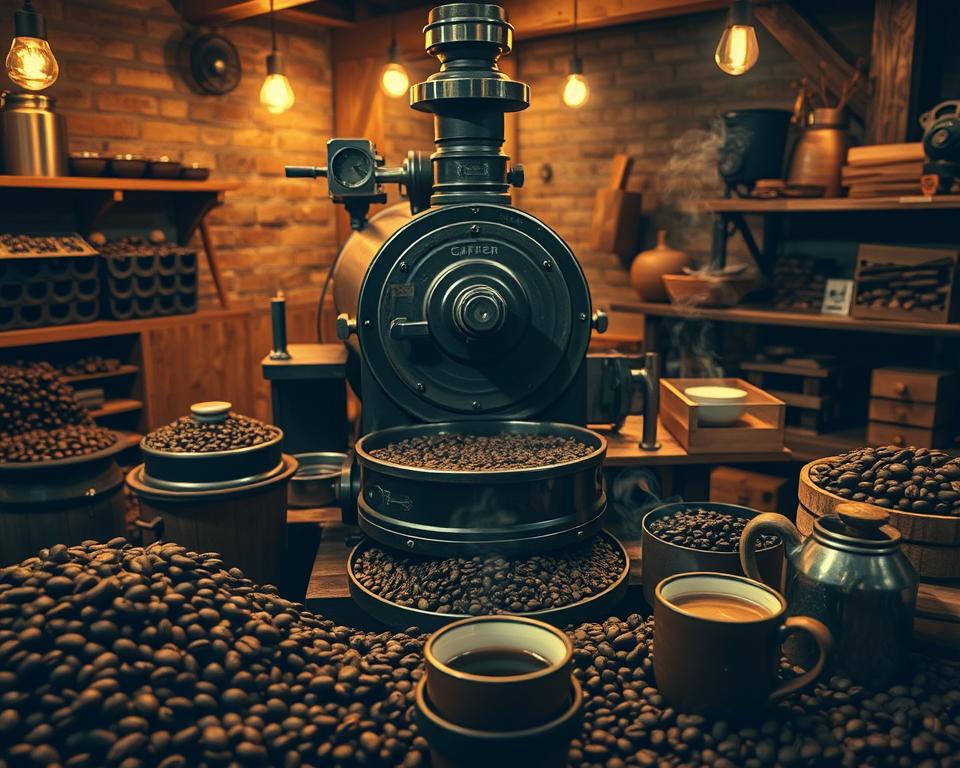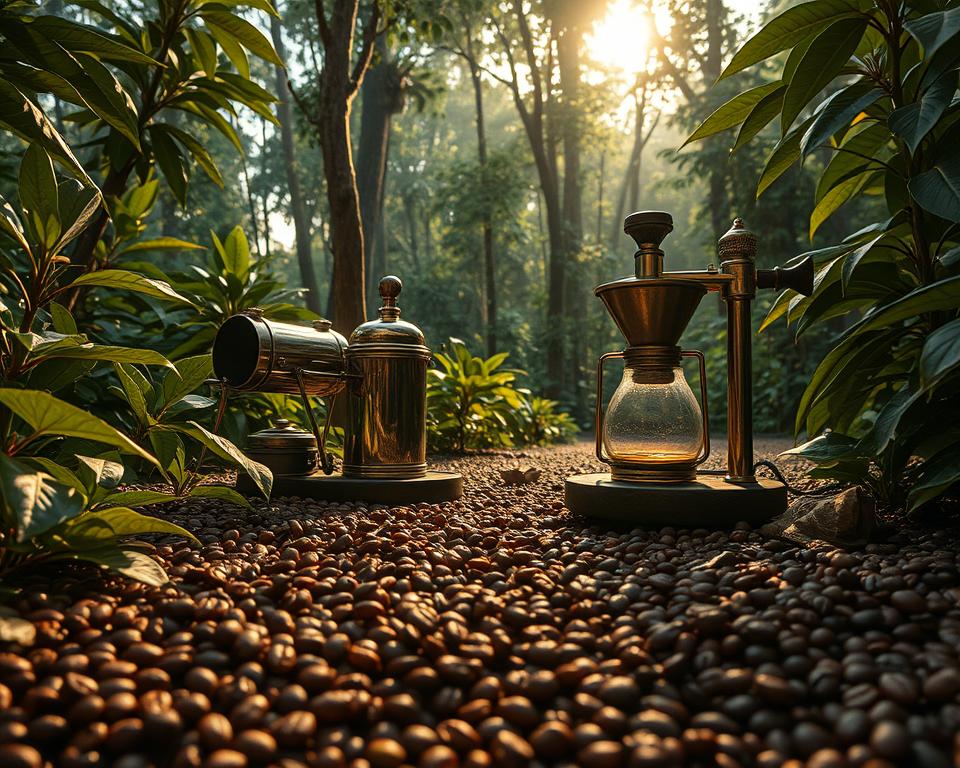Did you know over 60% of coffee lovers prefer organic coffee? They think it’s healthier and tastes better than regular coffee. This demonstrates a significant interest in selecting healthier options for our morning coffee. Let’s see why organic coffee is so popular.
Organic coffee isn’t just free from pesticides. It’s about the health benefits it offers. Imagine going from the earth’s rich soil to your coffee cup. Every step focusses on quality and being kind to the planet.
I find these aspects intriguing and important for our health.
We’re going to look at how organic farming helps the environment and our coffee. We’ll compare organic coffee vs. regular coffee benefits to see the big picture.
Join me as we explore how picking organic coffee can make our daily coffee routine healthier and better for the planet.

What Makes Coffee Organic?
Organic coffee is a top pick for many, but what sets it apart from regular coffee? Let’s explore what makes coffee organic and why it’s important.
Certification Standards
Getting an organic coffee certification means the coffee meets high standards. In the U.S., the USDA Organic Certification is top-tier. It says the coffee was grown without synthetic fertilizers or pesticides. We only allow natural methods of growth.
This ensures the coffee you drink is healthier and grown right.
Avoidance of Synthetic Chemicals
Organic coffee farming means no synthetic fertilizers. Farmers use natural stuff like compost and manure to feed the soil. This is beneficial for the planet and makes the coffee taste better.
We deal with pests naturally, using beneficial insects or plant-based repellents. Organic farming grows coffee that’s beneficial for the earth and tastes great.
Healthier soil equals healthier coffee.
We often overlook the soil when thinking about excellent coffee. But healthier soil means healthier coffee. By using organic farming practices, farmers make sure the soil is full of nutrients and free from harmful chemicals.
This effort not only increases the nutrient content of coffee but also benefits the environment.
Impact on Nutrient Content
The soil’s health affects the coffee bean’s condition. With sustainable coffee cultivation, farmers help the soil stay fertile and full of life. This lets coffee plants grow fully, making the coffee richer and tastier.
Have you ever thought about how the soil makes your morning coffee so complex?
Environmental Benefits
Choosing organic farming practices is beneficial for coffee and the planet. These methods cut down on soil erosion and help more kinds of life thrive. As we face environmental issues, every step toward sustainable coffee cultivation counts.
Isn’t it cool to know your coffee helps the planet?
The Health Benefits of Organic Coffee vs. Regular Coffee
Many people, including me, are switching to organic coffee for its health perks. Organic coffee is made without synthetic pesticides or fertilizers. This means it has fewer harmful chemicals.
Organic coffee is more than just chemical-free. It has more antioxidants, which fight off harmful free radicals. These can lower the risk of heart disease and cancer. Who wouldn’t want that added to their morning coffee?
Organic farming also means healthier soil for coffee plants. This leads to coffee with more vitamins and minerals. So, you get a caffeine boost and essential nutrients in one drink.
Switching to organic coffee made me feel better. Many people have less stomach trouble and headaches with organic coffee. This could be because it lacks chemical residues found in regular coffee.
In conclusion, choosing organic coffee brings many health benefits. From more antioxidants to natural goodness, switching could greatly improve your health.
Lower Pesticide Exposure
When I pick my morning coffee, I think about more than just taste. I worry about the chemicals in it. Organic coffee is a better choice because it has fewer harmful chemicals.
Studies show organic coffee has less pesticide residue. These pesticides from conventional farms can lead to health issues and negatively impact development. Choosing organic coffee helps protect my health and the planet.
| Coffee Type | Pesticide Residue | Health Risks |
|---|---|---|
| Organic Coffee | Low to None | Minimized Risk of Toxic Chemical Exposure |
| Conventional Coffee | Moderate to High | Increased Risk of Health Issues Due to Organic Coffee Pesticides |
Switching to organic coffee is a smart move. It cuts down on harmful substances, lowering health risks. This choice is good for our well-being.
Regular Coffee: Common Concerns
Enjoying my daily cup of coffee is more than just about the taste. There are big concerns with conventional coffee that we should think about. We need to look at the pesticide residue on coffee beans and its effect on our health.
Also, we should consider the environmental impact of how coffee is farmed.
Chemical Residues
Let’s talk about chemical residues first. Conventional coffee farming uses a lot of synthetic pesticides and fertilizers. These chemicals can leave residues on the coffee beans, which might end up in my coffee.
Drinking these residues over time could be harmful to my health, which I want to avoid.
Environmental Impact
Then there’s the environmental impact. Conventional coffee farming can significantly impact the environment. It leads to deforestation, soil degradation, and water pollution.
These practices can destroy ecosystems and hurt wildlife. The difference between conventional and organic coffee farming is huge, and it matters a lot to me.
Flavor Differences Between Organic and Regular Coffee
The taste of coffee is a journey filled with different flavors. The cultivation and roasting methods influence these flavors. Organic coffee has a unique taste because of the soil and climate it grows in.
Soil and Climate Effects
Healthy soil full of nutrients is key to coffee’s flavor. Organic farming helps keep the soil healthy without using harmful chemicals. This makes the coffee’s natural flavors stand out.
The climate, like temperature and rainfall, also affects how coffee grows. It adds to the special taste of organic coffee.
Roasting Methods
How organic coffee is roasted changes its flavor. We carefully roast organic beans to preserve their pure taste. Traditional roasting can be done quickly, which may result in the loss of some flavors.
Organic coffee uses slow roasting to keep its flavors rich and complex. This makes the taste of organic coffee deeper and more interesting.
Costs, considerations, and value
When you’re deciding on coffee, knowing the price difference between organic and regular is important. Organic coffee usually costs more. This is due to its production without synthetic chemicals, which benefits both the earth and us.
Is the additional expense justified? Let’s look at health benefits, environmental impact, and taste to find out.
Organic coffee often tastes richer and more complex because of the healthier soil and natural farming. Even though it costs a bit more, the better taste makes it a decent deal.
Also, organic coffee has fewer harmful substances, which is beneficial for our health. This means you might save on health costs later, making organic coffee a smart choice.
| Factors | Organic Coffee | Regular Coffee |
|---|---|---|
| Price | Higher | Lower |
| Health Benefits | High | Moderate |
| Environmental Impact | Positive | Negative |
| Flavor Profile | Rich, Nuanced | Consistent but Less Complex |
Next time you think about buying coffee, think about the big picture. The higher price of organic coffee is worth it for the health benefits and better taste. Isn’t it time we started choosing smarter?
Conclusion
As we conclude, choosing healthier coffee options is good for us and the planet. By picking organic coffee, we support sustainable practices. This choice affects our health and the earth’s health too.
Organic coffee is different from regular coffee in many ways. It doesn’t use synthetic chemicals and grows in healthier soil. This makes the coffee taste better and is safer for us.
Organic coffee might cost more, but it’s worth it for our health and the planet. Every choice we make helps create a better future. Let’s choose to drink coffee that’s good for us and the earth.
FAQ
What are the health benefits of organic coffee compared to regular coffee?
Organic coffee is packed with more antioxidants and nutrients. It has fewer harmful pesticides. Plus, it’s of better quality thanks to organic farming.
What does it mean for coffee to be organic?
For coffee to be organic, it must meet strict USDA Organic Certification standards. This means no synthetic chemicals, only natural fertilizers, and sustainable farming.
How does organic farming contribute to healthier soil?
Organic farming uses crop rotation and organic compost to boost soil health. This leads to coffee plants with more nutrients and better quality.
Are there environmental benefits to choosing organic coffee?
Yes, organic coffee farming is great for the environment. It uses land sustainably, protects ecosystems, and keeps biodiversity high.
What are the risks associated with pesticides in regular coffee?
Pesticides in regular coffee can be harmful. They can mess with hormones, cause neurological problems, and might even increase cancer risk. Organic coffee cuts down on these risks.
How do organic and regular coffee flavors differ?
Organic coffee tastes richer and more complex. This is thanks to healthier soils and no synthetic chemicals. The taste also depends on the soil and climate where it’s grown.
Is organic coffee more expensive?
Yes, organic coffee is pricey because of the hard work and sustainable methods used. But many people think it’s worth it for the health, environmental, and taste benefits.
What are the common concerns with regular coffee?
Regular coffee can have pesticide residues that are bad for health. It also harms the environment by hurting biodiversity and soil quality.
Why should I consider switching to organic coffee?
Switching to organic coffee means better health, less chemical exposure, and a tastier brew. It also helps the planet and gives you peace of mind about your choice.




